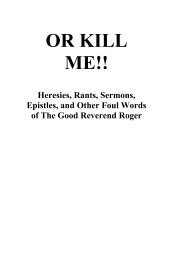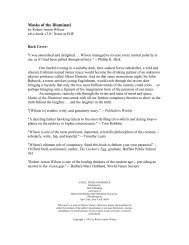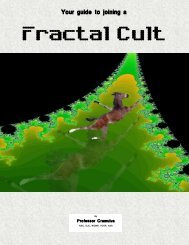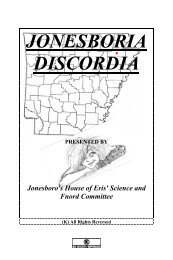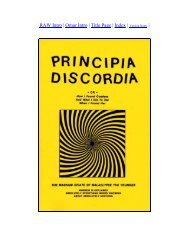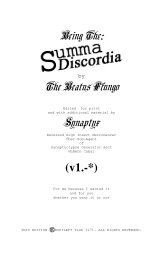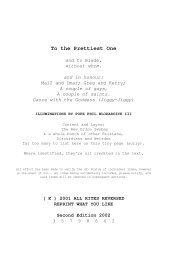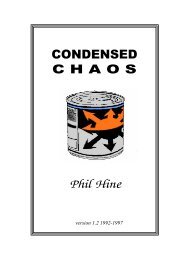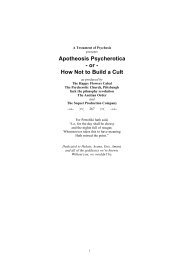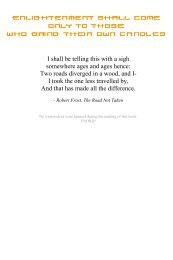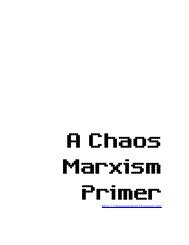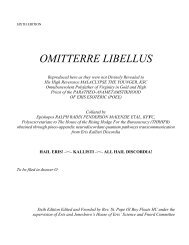Coincidance - Principia Discordia
Coincidance - Principia Discordia
Coincidance - Principia Discordia
You also want an ePaper? Increase the reach of your titles
YUMPU automatically turns print PDFs into web optimized ePapers that Google loves.
66 COINCIDANCE<br />
easily insulted, I will try to avoid flat statements in this epistle, and will<br />
merely ask some provocative questions.<br />
Henry James's The Turn of the Screw appears, to those who regard reading as<br />
defined above, to "be" an ordinary, if somewhat nasty, ghost-story. It "is"<br />
about a governess who discovers that the two children in her care are being<br />
haunted and vexed by ghosts who are not only vicious but perverse<br />
(probably child molesters).<br />
To those who think reading/thinking requires action or work, a second<br />
story appears: the novel then concerns a hysterical governess, sexually<br />
repressed, who projects her own illusions outward and manages, without<br />
intending it, to frighten one of the children to death. The "ghosts" are "in"<br />
her head.<br />
If reading does not require thought and work, the second interpretation<br />
"is" just pretentious nonsense invented by critics after James published his<br />
book. If reading/thinking does require work, how do we decide which<br />
interpretation is correct? And what does "correct" mean in this context?<br />
Could James have intended both possible meanings?<br />
Yeats's great poem on the 1916 Irish rebellion contains the line, "A<br />
terrible beauty is born." Stress "terrible" when reading it aloud; then stress<br />
"beauty." Which meaning did Yeats intend? Or did he intend both?<br />
Blake wrote, "May God us keep / From single vision & Newton's sleep."<br />
Leaving aside for the moment his animus against Newtonian mechanics,<br />
could "single vision" refer to what I have been calling mechanical reading and<br />
mechanical thinking?<br />
What the hell did Gurdjieff mean by his remarkable statement, "Life is<br />
real then only when I am"? Is there any sense left if one modifies it to, "A<br />
book is alive then only when the reader is"?<br />
Husserl disagreed with traditional philosophy (and anticipated modern<br />
neurology) in denying that we passively "receive" impressions. He insisted<br />
on an intentionality of consciousness, in which we vary from intense<br />
alertness, to moderate alertness, to weak alertness, to the total passivity that<br />
Occidental philosophers regard as normal.<br />
Do we "see" more in life when we are intensely alert? Do we see more in<br />
books and art when we are intensely alert? Is normal mechanical reading a<br />
species of what mystics call dreaming or sleep-walking?<br />
"To ascribe predicates to a people is always dangerous."<br />
—Nietzsche, unpublished note, 187-<br />
Racism, sexism and stupid prejudice in general consist, in logical terms, of



